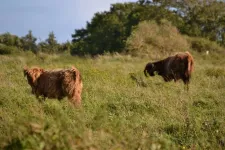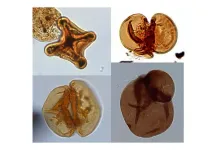(Press-News.org) The grazing of both domestic and wild animals is shaping landscapes across Europe. It can also contribute to multiple ecosystem services, such as providing habitat for biodiversity. Grazing systems with lower densities of animals and with minimal and only targeted applications of deworming and other medicinal treatments offer benefits for local biodiversity protection and various ecosystem services. However, this type of land management also poses a range of challenges, leading to a constant decline in the number of land users engaged in low-intensity grazing. A team of researchers led by iDiv, UL, and UFZ set out to investigate these challenges and potential interventions in eight European case studies. Between 2019 and 2021, they conducted 74 face-to-face interviews with farmers, landowners, livestock owners, and managers of a rewilding area with semi-wild herbivores, like wild ponies or semi-wild cattle.
Land users rely on subsidies, but money is not everything
The researchers focused on the motivation and challenges driving decision-making among all land users engaged in low-intensity grazing practices. This was despite economic considerations becoming increasingly important as land users’ revenue-generating activities are no longer sufficient to cover the rising cost of equipment, rent, and taxes.
“Money is not everything. Many of the land users we interviewed practice this type of grazing management because they think it is good, not out of economic motivation”, says first author Dr Julia Rouet-Leduc. Rouet-Leduc led the project as a former doctoral researcher at iDiv and UL and is now a postdoctoral researcher at the Stockholm Resilience Centre. Caring for nature and, in some cases, also the desire to maintain traditional agricultural practices were important aspects of the land users’ motivation. For example, a land user working with wild ponies in Galicia (Spain) shared: “The main reason for the maintenance of this system is that people … love the ponies; they ‘have a fever’, and this tradition runs very deeply in their hearts.”
The researchers found that many land users struggle with rules and regulations that are incompatible with low-intensity grazing management. For example, rules to mark or tag livestock – an extremely challenging task when animals are allowed to graze freely in large areas – were perceived as limiting. Land users also felt that the policies in place, especially the Common Agricultural Policy of the European Commission (CAP), were holding back nature-friendly and sustainable practices. For example, a land user in Romania noted that farmers were required to remove scrubs from their pastures or they would otherwise not be eligible for subsidies or even have to pay penalties. However, scrubs have important ecosystem functions, such as providing shade in the summer and as an additional food resource in the winter. In general, the CAP was perceived as too restrictive, and many land users chose not to apply for subsidies at all. “By not applying for CAP support, we have the freedom to really see what suits the local ecosystem”, a Belgian land user stated.
Rural exodus is putting traditional labour at risk
The interviews also showed that many land users struggle with socio-economic changes in the countryside. The so-called ‘Rural Exodus’ is leading to a lack of workforce, while physical work is still very much needed, especially for work with cattle or horses. “The next generation does not want to farm because it is too hard, too much work”, a land user from Lithuania said. “They usually move abroad and choose easier career options'.'
“The CAP could support farmers in High Nature Value farming regions and put incentives in place to preserve or restore extensive grazing systems,” senior author Dr Guy Pe’er, a senior researcher at UFZ and iDiv, suggests. “It’s not a lack of budgets but rather the lack of ambition to support sustainable farming.”
More flexibility and improved market access needed
The researchers used the interviews to derive and suggest interventions to encourage better grazing practices. “What is needed is more flexibility for land users”, Rouet-Leduc says. “Current policies are, for the most part, not encouraging such practices, and particularly not offering a level playing field for land users.” While the EU’s CAP offers important economic support, it also drives counter-productive management due to problematic requirements, she adds. Additional financial incentives could improve the support for more sustainable grazing management, according to the study’s authors. Especially in areas where land has been abandoned, there can be opportunities for rewilding large herbivores, which ultimately provide multiple ecosystem services. However, such systems require flexibility since they differ from management approaches with domestic animals.
The researchers also call for better labelling and certification for environmentally friendly grazing practices to increase public support and to help develop markets for such products. Some of the interviewed land users felt that market access could be improved by supporting direct marketing, for example, via farm shops.
“There are clearly real challenges for farmers, and they are not easy to overcome”, Pe’er explains in light of ongoing farmers’ demonstrations in countries like Germany, Poland, and Italy. “But removing environmental standards will not help land users. They need a package that includes an ambitious CAP reform, providing real support for farmers who need it to be more sustainable; the Nature Restoration Law to improve the standards of good management; and a framework for sustainable food systems to improve the market options for sustainable farming.”
This study was, among others, funded by the German Research Foundation (DFG; FZT-118) and as part of GRAZELIFE, a LIFE Preparatory Project on request of the European Commission to assess the impact of different grazing systems on ecosystem service provision (LIFE18PRE/NL002).
Kati Kietzmann
END
Low-intensity grazing is locally better for biodiversity but challenging for land users, a new study shows
Land users struggle with inflexible regulations and a lack of workforce
2024-04-30
ELSE PRESS RELEASES FROM THIS DATE:
An omega-6 fatty acid may reduce the risk for bipolar disorder
2024-04-30
Philadelphia, April 30, 2024 – A genetic propensity to higher circulating levels of lipids containing arachidonic acid, an omega-6 polyunsaturated fatty acid found in eggs, poultry, and seafood, has been found to be linked with a lower risk for bipolar disorder, according to a new study in Biological Psychiatry, published by Elsevier. This new evidence paves the way for potential lifestyle or dietary interventions.
Bipolar disorder is a debilitating mood disorder characterized by recurring episodes of mania and depression. Although its etiology is still unclear, previous studies have shown that ...
New breast cancer screening recommendations aim to address health inequities, especially among Black women
2024-04-30
In an effort to improve early detection of breast cancer and address disparities in outcomes, the US Preventive Services Task Force (USPSTF) has issued updated breast cancer screening recommendations to now advise all women to undergo routine screening every other year starting at age 40 —representing a significant shift from previous guidelines, which recommended screening starting at age 50 and engaging in individualized decision-making for women aged 40 to 49.
The revised guidelines aim to enhance early detection of breast cancer and tackle disparities in breast cancer mortality, particularly among Black women, who are more likely to have aggressive ...
AGS honors expert and emerging geriatrics leaders at 2024 virtual annual scientific meeting (#AGS24)
2024-04-30
New York (April 30, 2024) – The American Geriatrics Society (AGS) annually honors researchers, clinicians, educators, and emerging health professionals who have made outstanding contributions to high-quality, person-centered care for older adults. This year’s award recipients include 19 leaders representing the breadth of medical disciplines championing care for us all as we age.
Choosing Wisely Champion Award
Paras Goel, PT, DPT, Med, MBA, GCS
Clinical Student Research Award
Elizabeth Margaret Ann Kelly
Clinician of the Year Award
Joyce Fogel, MD
David ...
Protecting endangered monkeys from poachers, habitat loss
2024-04-30
COLUMBUS, Ohio – The Tai Forest Monkey Project has operated a research field station in west Africa’s Ivory Coast for 30 years, but on the one day since its opening that the site was unstaffed because of conflict in nearby Liberia, poachers took advantage – and killed 18 endangered monkeys.
The anecdote is a telling example, scientists say, of how thousands of field stations studying primates in forests around the world not only generate knowledge about these threatened species, but also contribute to ...
China’s bid to decarbonize may have hidden costs
2024-04-30
ITHACA, N.Y. – Environmentalists rejoiced when China announced its commitment to reach carbon neutrality by 2060, but the decarbonization of China – which emits 27% of global carbon dioxide and a third of the world’s greenhouse gases – may come with hidden costs and hard environmental choices, according to new research.
In a paper published in Communications Earth & Environment, Stefano Galelli, associate professor at Cornell University’s School of Civil and Environmental Engineering, and colleagues attempt to quantify how decarbonizing the China Southern Power Grid, which provides electricity ...
Climate change and mercury pollution stressed plants for millions of years
2024-04-30
The link between massive flood basalt volcanism and the end-Triassic (201 million years ago) mass-extinction is commonly accepted. However, exactly how volcanism led to the collapse of ecosystems and the extinction of entire families of organisms is difficult to establish. Extreme climate change from the release of carbon dioxide, degradation of the ozone layer due to the injection of damaging chemicals, and the emissions of toxic pollutants, are all seen as contributing factors. One toxic element stands out: ...
Stowers Institute for Medical Research appoints new Assistant Investigator
2024-04-30
KANSAS CITY, MO—April 30, 2024—The Stowers Institute for Medical Research announces the appointment of Kamena Kostova, Ph.D., as its newest Principal Investigator. Kostova, an accomplished cellular and molecular biologist, will join the Institute in Fall 2024 as an Assistant Investigator. She brings with her an established research program focused on understanding cellular responses to ribosome breakdown and the relationship these responses have with complex diseases such as cancer and neurodegeneration.
Kostova is currently ...
Science council: “Tasks excellently fulfilled”
2024-04-30
The German Science and Humanities Council (Science Council) assessed the German Fed-eral Institute for Risk Assessment (BfR) in Berlin on 7 and 8 November 2023 and published its assessment today, 22 April 2024. As the highest German scientific commission, it certi-fies that the BfR “fulfills tasks of great social relevance” (protection of human health, in-forming the public about health risks posed by chemicals and biological substances) “on the basis of very good research”. It is characterised by an “extremely rapid response capability, a pronounced application orientation and a high degree of being up-to-date with its topics”. “We are delighted ...
USC-led study introduces a new and improved way to grow the cells that give rise to the kidney’s filtration system
2024-04-30
In a new study published in Cell Stem Cell, USC scientists report significant progress in cultivating nephron progenitor cells (NPCs), the cells destined to form the kidney’s filtration system, the nephrons. NPCs hold immense promise for understanding kidney development, modeling diseases, and discovering new treatments.
“By enhancing our capability to grow NPCs from human stem cells, we create a new avenue for understanding and combating congenital kidney diseases and cancer,” said corresponding and lead author Zhongwei Li, an assistant professor of medicine, and stem cell biology and regenerative medicine ...
USPSTF recommendation statement on screening for breast cancer
2024-04-30
Bottom Line: The U.S. Preventive Services Task Force (USPSTF) recommends biennial screening mammography for women ages 40 to 74. The USPSTF concludes that the current evidence is insufficient to assess the balance of benefits and harms of screening mammography in women 75 years or older. The USPSTF concludes that the current evidence is insufficient to assess the balance of benefits and harms of supplemental screening for breast cancer using breast ultrasonography or magnetic resonance imaging (MRI) in women identified to have dense breasts on an otherwise negative screening mammogram. Among ...
LAST 30 PRESS RELEASES:
Scientists deliver new molecule for getting DNA into cells
Study reveals insights about brain regions linked to OCD, informing potential treatments
Does ocean saltiness influence El Niño?
2026 Young Investigators: ONR celebrates new talent tackling warfighter challenges
Genetics help explain who gets the ‘telltale tingle’ from music, art and literature
Many Americans misunderstand medical aid in dying laws
Researchers publish landmark infectious disease study in ‘Science’
New NSF award supports innovative role-playing game approach to strengthening research security in academia
Kumar named to ACMA Emerging Leaders Program for 2026
AI language models could transform aquatic environmental risk assessment
New isotope tools reveal hidden pathways reshaping the global nitrogen cycle
Study reveals how antibiotic structure controls removal from water using biochar
Why chronic pain lasts longer in women: Immune cells offer clues
Toxic exposure creates epigenetic disease risk over 20 generations
More time spent on social media linked to steroid use intentions among boys and men
New study suggests a “kick it while it’s down” approach to cancer treatment could improve cure rates
Milken Institute, Ann Theodore Foundation launch new grant to support clinical trial for potential sarcoidosis treatment
New strategies boost effectiveness of CAR-NK therapy against cancer
Study: Adolescent cannabis use linked to doubling risk of psychotic and bipolar disorders
Invisible harms: drug-related deaths spike after hurricanes and tropical storms
Adolescent cannabis use and risk of psychotic, bipolar, depressive, and anxiety disorders
Anxiety, depression, and care barriers in adults with intellectual and developmental disabilities
Study: Anxiety, gloom often accompany intellectual deficits
Massage Therapy Foundation awards $300,000 research grant to the University of Denver
Gastrointestinal toxicity linked to targeted cancer therapies in the United States
Countdown to the Bial Award in Biomedicine 2025
Blood marker from dementia research could help track aging across the animal world
Birds change altitude to survive epic journeys across deserts and seas
Here's why you need a backup for the map on your phone
ACS Central Science | Researchers from Insilico Medicine and Lilly publish foundational vision for fully autonomous “Prompt-to-Drug” pharmaceutical R&D
[Press-News.org] Low-intensity grazing is locally better for biodiversity but challenging for land users, a new study showsLand users struggle with inflexible regulations and a lack of workforce





